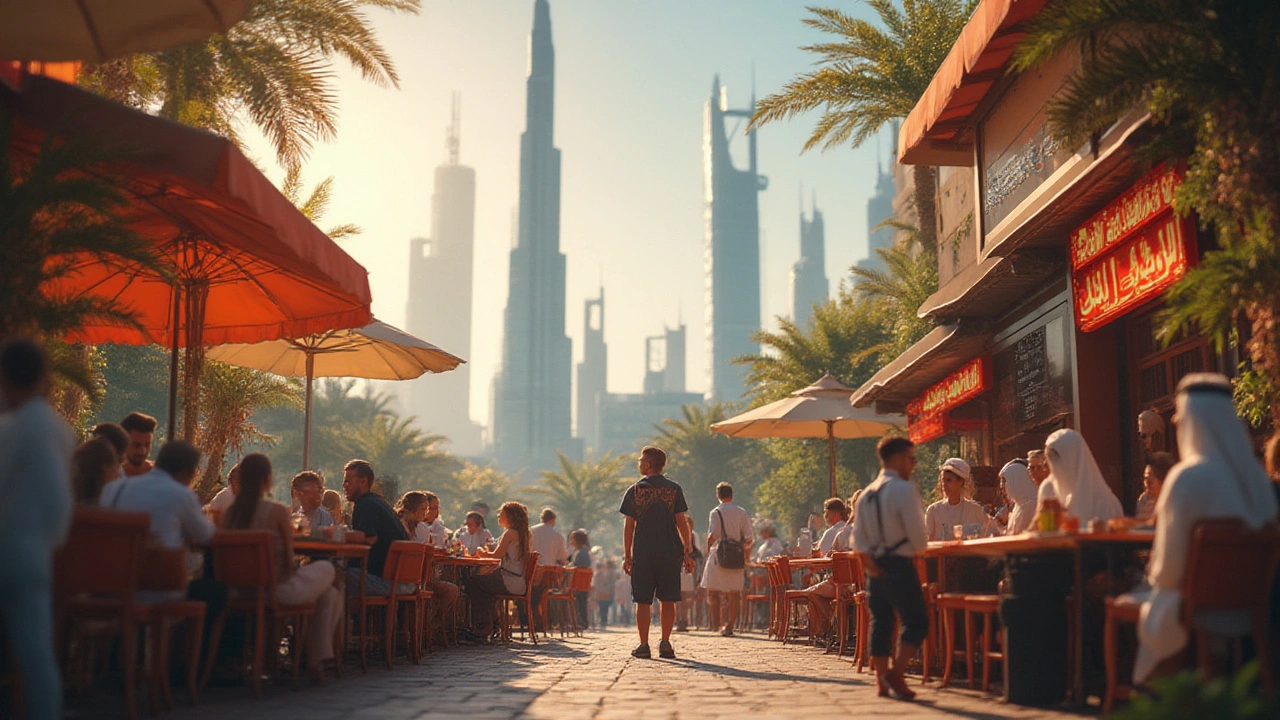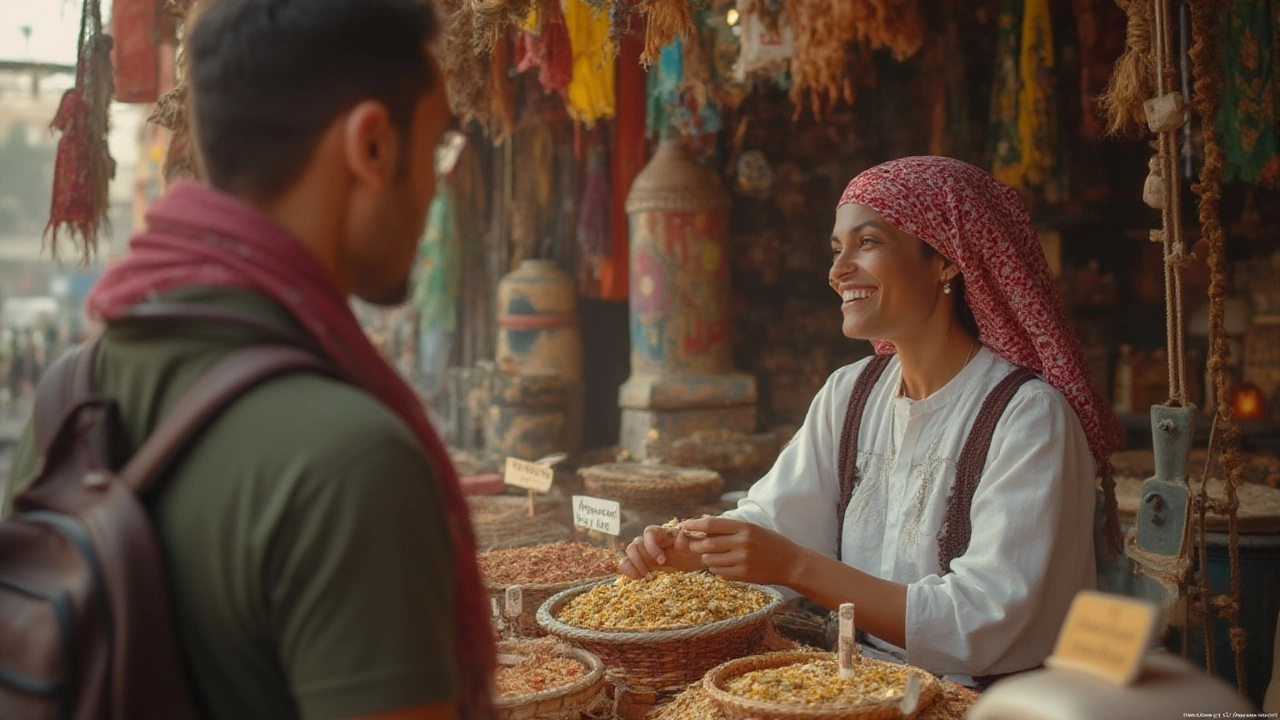English in Dubai: How Widely Is It Spoken and Will Locals Understand You?
 Jul, 7 2025
Jul, 7 2025
Imagine arriving in a city with some of the tallest skyscrapers you’ll ever lay eyes on, endless luxury shopping, and a skatepark of cultures swirling together. But there’s one nagging fear: Will you be stuck miming your coffee order because you don’t speak a word of Arabic? Here’s the wild reality—almost everyone in Dubai, from the Uber driver to the mall barista, can chat with you in English. You’re not alone if you’re surprised; it catches first-timers off guard all the time.
Why English Is Everywhere in Dubai
Dubai isn’t your typical Middle Eastern city. It’s practically the poster child for global living—expats outnumber locals by a huge margin, with estimates saying about 85% to 90% of the population is foreign-born. That’s millions of people from every corner of the globe, thrown together in a city built on business, tourism, and that “bigger is better” vibe. This quirk isn’t accidental; it’s by design. The city’s leadership structured Dubai to become an economic powerhouse, targeting international finance, hospitality, and tech—industries where English is king.
Here’s a not-so-secret fact: English is the unofficial language of business in Dubai, even though Arabic is the official language of the United Arab Emirates. Most contracts, emails, and even phone calls in the business world are handled in English. Public signs at the airport, street names, store directions—bilingual almost everywhere, but English always comes first. Public transport announcements switch between both. Even the menus at shawarma stalls are often bilingual, at the very least. If you’re worried that you need to memorize the Arabic alphabet before your trip, breathe easy—a smile and a confident “Hi” will take you far.
The Reality for English Speakers: Day-to-Day Life and Common Scenarios
Ordering food in Dubai? English gets you through every kind of menu, whether you’re at a Michelin-starred brunch on a hotel rooftop or grabbing falafel from a tiny alleyway café. The hotel concierge will switch to English as soon as you approach. Supermarkets, pharmacies, mall info desks—all the essential spots are staffed with people used to fielding questions in a dozen accents. Even taxi drivers, coming from places as varied as the Philippines, Pakistan, or Kenya, rely on English as the neutral ground. You'll catch English everywhere at Dubai’s entertainment spots: buying movie tickets, asking about ski sessions at Mall of the Emirates, or renting a jet ski by the Marina.
With tourists from every continent, the staff in hotels and attractions default to English for everything from safety briefings to event instructions. According to Dubai’s tourism board, the city saw over 17 million international overnight visitors in 2024. That rush of people, especially from the UK, India, Russia, and Australia, means that speaking fluent English isn’t just helpful—it’s a job requirement for anyone working in customer service. Schools, both public and private, often teach in English, and universities in Dubai frequently use English as the medium of instruction. Even expats who’ve picked up a bit of basic Arabic will admit they go straight back to English unless they’re haggling at a traditional souk or making a local friend smile.

Where You Might Need a Few Words of Arabic (But Not Really)
The only setting where you’ll feel a hint of the language barrier is in deeply local, non-tourist areas, or when trying to chat with older Emiratis. Roadside tea stands (called 'chai karak'), traditional markets, or government offices deal sometimes with people who prefer Arabic. That said, most will respond in English too, even if it's basic English. It helps to know a couple of words—“shukran” (thank you), “salaam” (hello)—but you’ll never be stranded linguistically. Even in hospitals or police stations, staff by law must speak English. There's even a toll-free translation hotline (800-46342) run by the government for those very rare language emergencies.
| Category | Percentage | Top Languages Spoken |
|---|---|---|
| Expatriate Population | ~88.5% | English, Hindi, Urdu, Filipino, others |
| Arabic Speakers (Native) | ~11.5% | Arabic, English |
| Hotels and Tourism English Usage | ~100% | English, Arabic, others |
| Official Government Services (with English) | >95% | Arabic, English |
But if you want to toss in a greeting or thank you in Arabic, it’ll be appreciated—you might even get a warmer smile, and a better price on dates at the souk. This isn’t a secret handshake, but it’s a little extra magic. People admire anyone making the effort, even if your accent is wonky.
Tips for Visitors: Making the Most of Speaking English in Dubai
First tip—don’t worry about regional British or American accents. The Dubai version of English is neutral and peppered with words from Indian English, Filipino slang, and the local Arabic. Even if someone says, “You want water, boss?” when you’re picking up groceries, that’s normal. English speakers from anywhere fit right in. If you get a puzzled look when asking for something, try simpler words or less slang. For example, “flat white” isn’t as commonly understood in Dubai coffee shops as “white coffee.”
Download a translation app for the odd moment you’re way off-grid or trying to read handwritten forms in Arabic. Google Translate works well on menus and street signs, but you’ll barely need it for conversation. Major events, from concerts to sporting tournaments and business expos, use English exclusively for tickets, safety instructions, and announcements. Dubai’s obsession with service means people want you to feel comfortable—don’t hesitate to ask for clarification, and you’ll almost always get patient help.
You’ll notice English creeping into unexpected corners—the morning delivery man who drops off your water, your Uber Eats notifications, banking text alerts, even the automated voice in the elevator. Digital services and apps, used by everyone in Dubai, default to English, with Arabic as the optional backup. Booking tours, tickets, or taxis online? All in English. Even the local radio station, Dubai Eye 103.8, broadcasts entirely in English, serving up interviews with entrepreneurs, artists, and celebrities from around the world.
- At many tourist attractions, staff will offer brochures in up to 10 languages, but English is always the first choice.
- In schools and universities, lesson plans, assignments, and even parent-teacher meetings are conducted in English unless specified otherwise.
- Major festivals, cultural exhibitions, and city events publish their schedules and info in English to cater to the international crowd.
- Keep your English clear, maybe slow it down just a touch, and skip idioms that new English learners might not know (like “once in a blue moon”).
If you’re planning any business in Dubai, rest assured—your contracts, invoices, presentations, and networking will happen in English. Sometimes you’ll overhear Arabic in the halls, but the meeting itself will snap right back to English. The city’s largest banks, law firms, and hospitals are the same story.
The only places English might pause for a moment: mosque tours or Friday sermons, which are typically in Arabic with English translation provided. Cultural performances, such as poetry readings or traditional music, sometimes stick to Arabic but event staff usually offer a summary or program notes in English if you ask. If your question is complicated (like “How do I argue a traffic ticket?”) in a less touristy area, someone will help find someone who’s fluent.
So, can you speak English in Dubai? Yes—and for most, it’s the everyday language not just for expats, but for most Emiratis working in business, hospitality, and government. Whether you’re a tourist or hoping to live and work in this mind-blowing city, your English is your ticket in. You could stay a year and pick up only a handful of words in Arabic—but if you want to push your experience deeper, why not grab a phrasebook and drop a "marhaba" next time someone says hello?
Dubai Escort